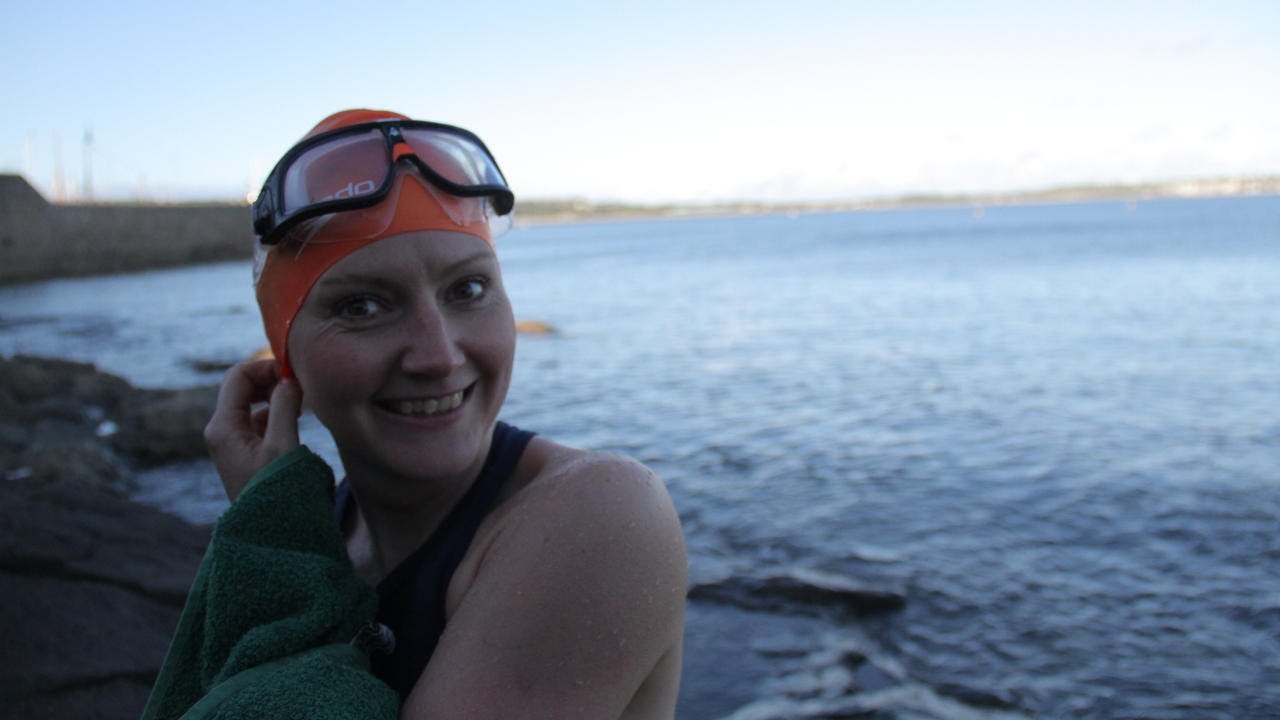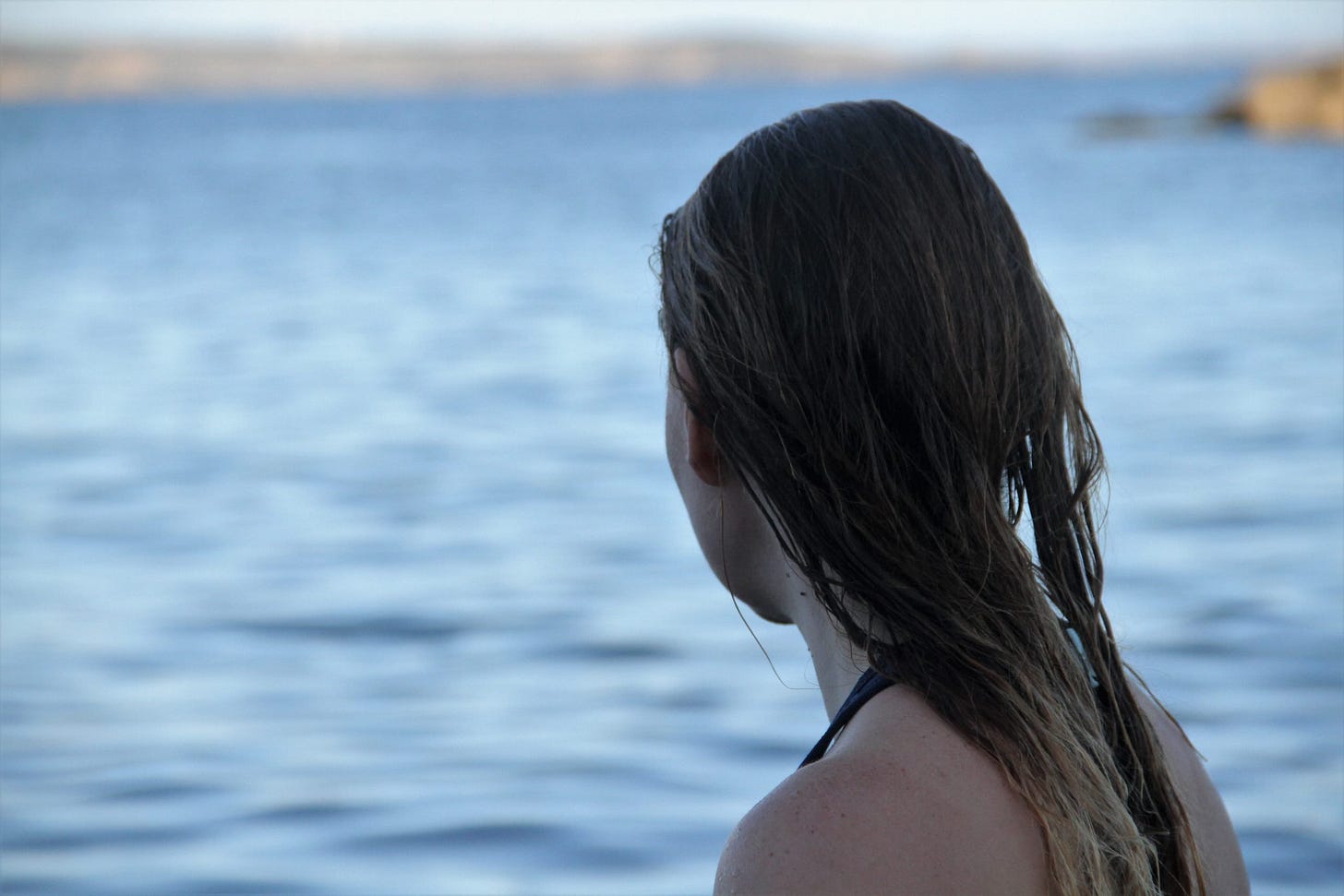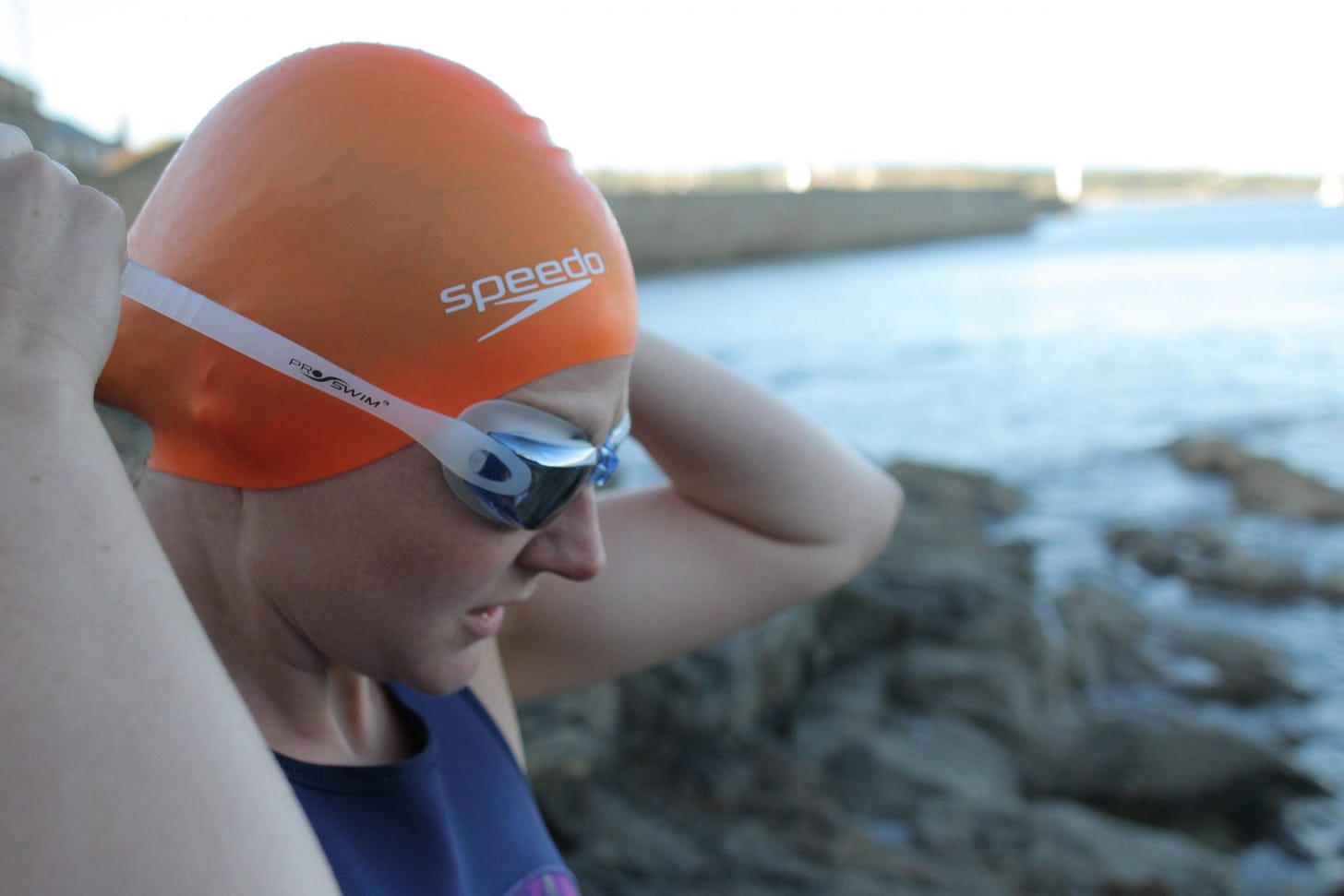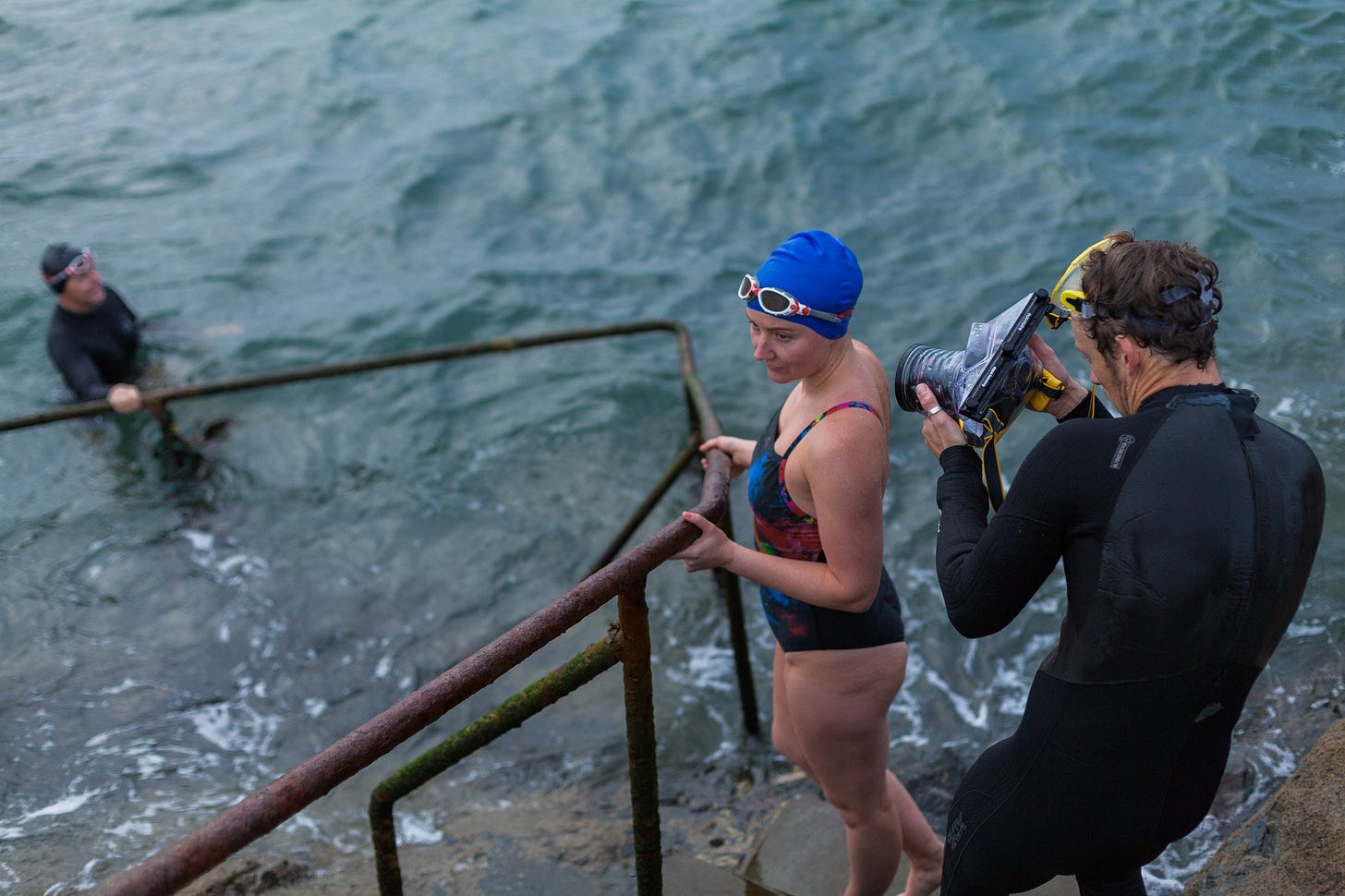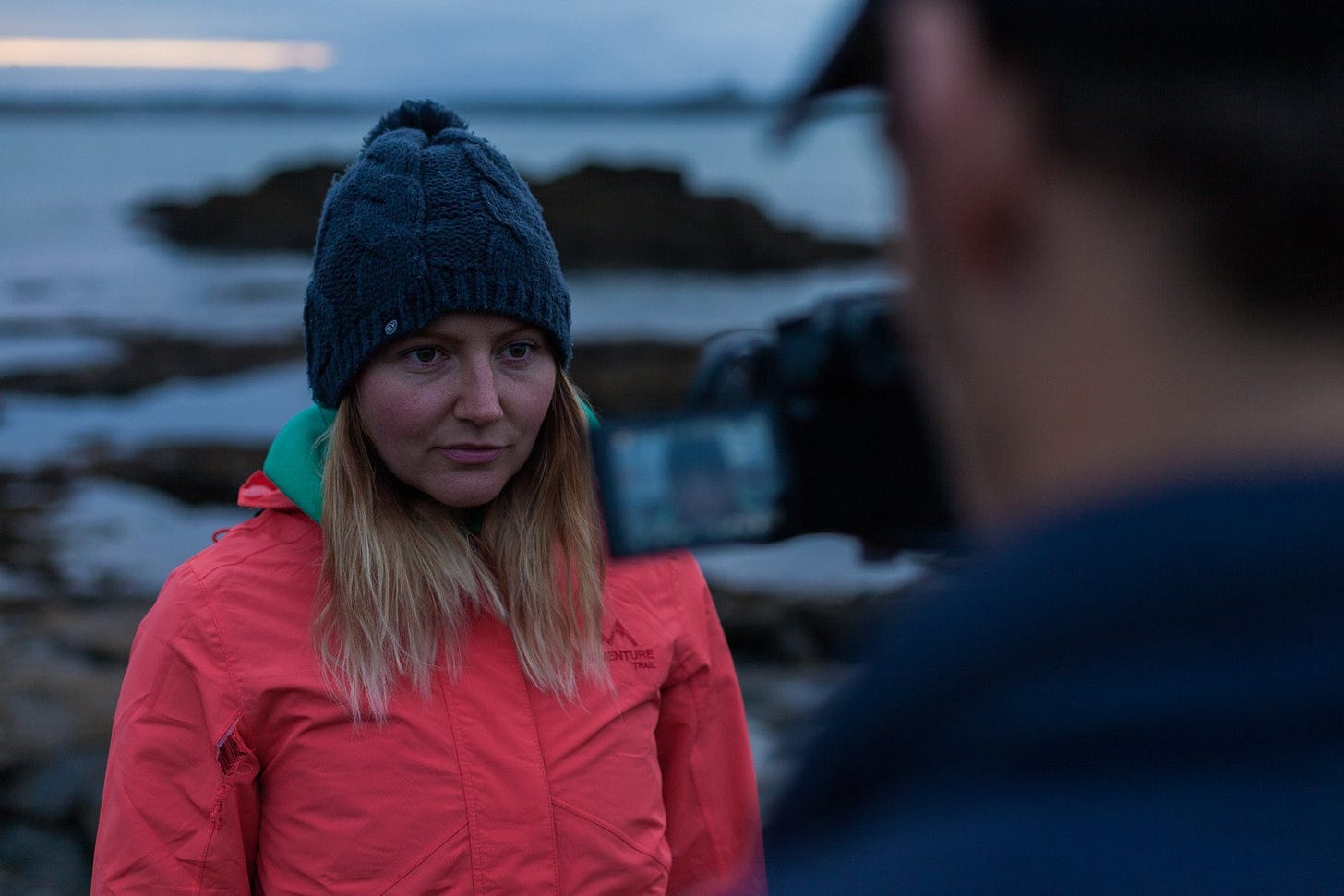Tonic of the Sea - A Story of Recovery with Katie Maggs
“Being in open water, there is something about the fact that you’re quite ‘away’ from other things. You get that feeling of being ‘inside’ nature, you’re immersed in it. All of the things that I lost through burnout or stress and anxiety - feeling brave, feeling capable, feeling physically strong, mentally strong, being able to have fun and enjoy something - swimming is what brought all of those things back. If you can manage to get into the sea in the winter, when it’s freezing cold and there’s huge waves - even though I was really unwell, and I’d literally dragged myself there - every day I (gradually) rebuilt those parts of me that were lost.”
Katie Maggs is a swimmer, Deputy Head teacher, mother, and down-right amazing, fun, friendly person (we know, we met her!). The story of how she came to be a wild swimmer has been told through the award-winning film ‘Tonic of the Sea’. One of the many festivals this was shown at was Kendal Mountain festival, where we caught up with Katie...
***
There seems to be a strong link between outdoor swimming and mental health - why do you think swimming seems to have such a positive impact?
"When we say mental health, whether it’s stress, anxiety, depression - what is essentially linked to all of those is a loss of self. It’s losing things like being able to feel proud, feeling brave, creative, joyful, positive… (...) The sea, and wild swimming... there seems to be a theme that it tends to bring those back, it rebuilds it."
When we say mental health, whether it’s stress, anxiety, depression - what is essentially linked to all of those is a loss of self. It’s losing things like being able to feel proud, feeling brave, creative, joyful, positive… all of those things were taken from me and are taken from a lot of other people. The sea, and wild swimming... there seems to be a theme that it tends to bring those back, it rebuilds it. It’s incredible really - it’s free, it’s accessible - there are lakes, rivers, the sea etc close to most people, so it’s an incredible thing that’s available to us.
Starting from the beginning, how did you come to swimming as a way of recovery?
It was a gradual process. I started being unwell going to work - dull headaches, feeling dizzy, losing concentration, reading emails and not being able to make sense of them even though it’s stuff I’d been doing easily for 10 years, but it was just confusing me. I had migraines, I was feeling nauseous. Then I developed facial twitches - my eye was twitching all the time, twitching in my mouth, my face - which spread to my hands and legs. It was all a nervous reaction, it was my body basically becoming horrifically fatigued. But as we do, I had lots of responsibilities - I have three teenage boys (two stepsons, one of my own), full time work, caring for a parent... I was literally dragging my poor sorry body around.
"I started being unwell going to work - dull headaches, feeling dizzy, losing concentration, reading emails and not being able to make sense of them even though it’s stuff I’d been doing easily for 10 years, but it was just confusing me. I had migraines, I was feeling nauseous. Then I developed facial twitches - my eye was twitching all the time, twitching in my mouth, my face - which spread to my hands and legs."
I just kept going back to the doctors, thinking I needed an eye test, I thought I had a neurological condition - I wasn’t relating it to stress or exhaustion. Until I was at work and I realised I just wasn’t functioning at all, and when you have hundreds of students, it becomes blatantly obvious - although I was still turning up, I wasn’t really all there. I’d had months of insomnia. I ended up not sleeping, and being afraid to sleep, because my muscle jerking turned into a condition called myoclonus - large muscle jerks - which all the health professionals could relate to was that my nervous system just crashed and went into overdrive because I was so exhausted.
"night time became such a horrible time. It was on one usual sleep derived morning that I’d just got up to do my sons packed lunch, and I just couldn’t organise myself to make a sandwich for him. It just overwhelmed me, confused me"
Because of that, night time became such a horrible time. It was on one usual sleep derived morning that I’d just got up to do my sons packed lunch, and I just couldn’t organise myself to make a sandwich for him. It just overwhelmed me, confused me - I ended up in tears. Then I was signed off work for about 6 months.
"It’s really difficult when you’re quite a capable person, you’re performing, always going for the next run, the next job or promotion – but then I suddenly couldn’t even get myself dressed properly. It all happened so quickly - about 2 months for me to go from superwoman to full blown not functioning at all"
So, from that point, how did you find swimming and the Battery rocks swimmers?
It was quite a long time after. I’ve always really liked photography so since I’d stopped sleeping, dawn kind of represented that I could just get out and not be trapped inside. I’d often get out and walk, but I’d just be crying, tearful, ‘done-in’ basically, defeated. I was really frightened about what had happened to my body. It’s really difficult when you’re quite a capable person, you’re performing, always going for the next run, the next job or promotion – but then I suddenly couldn’t even get myself dressed properly. It all happened so quickly - about 2 months for me to go from superwoman to full blown not functioning at all. For me to be signed off work was huge! I’d been there for 10 years and I’d never even been off for a cold. For somebody to take your role away from you - something that is part of you and gives you your self-esteem - it’s really very difficult.
“By the sea, that’s where I met the Battery rock swimmers. They asked if I was OK - it was very early in the morning, so it was probably quite odd seeing me sitting there. I think they just thought ‘who’s this poor soul’.”
I’d walk to the sea with my camera and I’d huddle on the rocks in the cold, not really seeing any kind of escape. I’d done everything the doctor asked me to - I’d tried yoga, medication, mindfulness, trying to do crazy exercise to see if that would work… but what I didn’t realise is I was trying to fight it as opposed to letting it be what it was, so that was actually causing more anxiety. But by the sea, that’s where I met the Battery rock swimmers. They asked if I was OK - it was very early in the morning, so it was probably quite odd seeing me sitting there. I think they just thought ‘who’s this poor soul’. After quite a few weeks, I learnt a bit about them - some had been teachers and struggled with stress, some had children early on - and all said sea swimming really helped them. It spiraled - I eventually trusted them in getting me in.
What was that first swim like?
It was awful!
Please tell me it was summer?!
No, it wasn’t! I was just so unwell that I couldn’t agree with them that I’d be able to swim. I didn’t have the bravery to get in, I’d lost all sense of myself. So, it was awful - I didn’t want to get in, I felt ridiculous in a swimming costume and hat, I was thinking ‘what am I doing here, it’s so stupid, I’ve tried everything’. And people say to me ‘well you must have been well enough if you could get in the sea’. But it was almost the reverse, I’d just given up, I had nothing left so I just thought ‘what difference will it make’.
“it was strange - I’d maybe miss a few mornings, then I’d just find myself there on my morning walk, knowing people were kind of waiting. And every time I got there they’d be like ‘Hi Katie, come on, let’s get back in!’ (...) It almost felt like a miracle that I met them really - these incredibly kind people who invited me to swim with them - they didn’t have to do that.”
Then slowly, over time... it was strange - I’d maybe miss a few mornings, then I’d just find myself there on my morning walk, knowing people were kind of waiting. And every time I got there they’d be like ‘Hi Katie, come on, let’s get back in!’. I suddenly had this support network of people, and most were older so had more life experience, and I felt really supported. Not that I wasn’t getting that from my family, but sometimes in life you need a separate group - your own family feel sad, they want to help, they worry whether they took a role in how you got unwell - all of those factors. But these people were separate, and they were just there to help me, they just cared whether I was OK. It almost felt like a miracle that I met them really, these incredibly kind people who invited me to swim with them - they didn’t have to do that. So it snowballed, and I swam for months with them.
How long did it take from the point of thinking ‘this is ridiculous’ to actually believing it was helping?
I was so unwell that it’s hard to remember, because honestly, I just turned up in a state! I just know that I got there and I got in. It started very much that I just got in, that’s all I did, I felt like crying, it was freezing, I was thinking ‘what am I doing’, then I’d just get out and go home.
“It started very much that I just got in, that’s all I did, I felt like crying, it was freezing, I was thinking ‘what am I doing’, then I’d just get out and go home.”
But gradually… after meeting Mike, an ex lifeguard, he just kind of made me feel safe in the water, so every so often without me realising he’d say ‘we’re going to go to this little bit, and I’ll come with you’. There’s seaweed and seals, so you can get a bit freaked out, and when it’s choppy and rough it could be quite scary - but with him with me I felt safe. He just allowed me to build gently on my own without pushing or expecting anything of me. And every so often, over quite a few months, I’d realise I’d done a tiny bit more - I’d swam in a different direction away from where I could stand or something. It built up until months later - I had always looked at this swimming buoy that people went to and thought ‘I’m never ever going to get there’ - and then all of a sudden I’d swam out there and had this celebration of ‘oh my god I’ve done it!’.
“Each little swim, each little tiny bit that I did, whether it was getting used to having seaweed on me, or swam a little further, that’s what rebuilt me (...) Medication can’t rebuild courage, it can’t rebuild physical or mental strength, whereas swimming in the sea did do that. Or anything else you can do outdoors, it’s something which gives you a little bit of pride in yourself again.”
Each little swim, each little tiny bit that I did, whether it was getting used to having seaweed on me, or swam a little further, that’s what rebuilt me in a way which medication can’t do. Medication can’t rebuild courage, it can’t rebuild physical or mental strength, whereas swimming in the sea did do all of that. Or anything else you can do outdoors, it’s something which gives you a little bit of pride in yourself again.
How long was your recovery process, or is it ongoing?
The whole process of being unwell was probably a year, but since starting swimming probably 6 months. The film came out just over a year ago. I was really nervous - I had to be quite real, and I was quite vulnerable still.
“Making the film was hard because it was going back to a place I didn’t really want to revisit, because it terrified me still - I didn’t feel confident at the point of making the film that I’d never go back there. I do feel that now, but I know you can never say that, that’s why I still swim!”
One of the biggest parts for me was that I’d essentially done this to myself. I almost felt angry that I’d allowed it to happen. Making the film was hard because it was going back to a place I didn’t really want to revisit, because it terrified me still - I didn’t feel confident at the point of making the film that I’d never go back there. I do feel that now, but I know you can never say that, that’s why I still swim!
Do you have any advice for anyone feeling the same as you did?
There’s quite a lot of research coming out about how rising early is good for your health. Most people take 20 minutes to look at their phone in the morning. That’s 20 minutes you could have done something - walked around your local park, whatever. If you get up half an hour earlier than everyone else, it’s such an incredible start to your day. I get home, everyone’s still asleep, I’ve been for a swim, I’ve seen some lovely people, I’ve been in nature, it’s quiet - I feel calm, like I’ve nurtured myself, so it gives me the energy to look after everyone else for the rest of the day.
“when you’re lying in bed in the morning you can talk yourself out of almost anything. But I never regret it. No matter how stormy it is, whether it’s hailing, there’s always something incredible to see - dolphins, rainbows, the sea conditions can be really incredible and exhilarating.”
I never bound out of bed wanting to do it, sometimes I’m almost in tears going down on my bike – and when you’re lying in bed in the morning you can talk yourself out of almost anything. But I never regret it. No matter how stormy it is, whether it’s hailing, there’s always something incredible to see - dolphins, rainbows, the sea conditions can be really incredible and exhilarating.
I know perhaps having young kids is a barrier - but even going in your garden if you’ve got one, doing some yoga, listening to the birds. You will feel amazing for it, and if you can find a reward - mine is that I could take a really nice sunrise photo, and I’m meeting friends - something that makes you feel like you’re missing out if you don’t go, it makes getting up easier.
So many have contacted me - a theme of successful working women, people who’d started businesses, felt completely overloaded, really struggling. It’s not because you can’t do the job - it’s that too much has been put on you, you’re trying to do too much. You can go along in a full-on job like that fine, but as soon as you start to pile things on top - for me my son wasn’t doing too well starting secondary school, my father was unwell - nobody can cope at that level long term.
“If you’re not getting any time for yourself at all, there is no quality of life in that, none whatsoever. I’d never turn my back on my job, because I love it, or my Dad or my son because I love them. It’s not about that or placing blame, it’s me taking responsibility for how I manage those things, because I want to do them, but I need to have the energy to do them.”
If you’re not getting any time for yourself at all, there is no quality of life in that, none whatsoever. I’d never turn my back on my job, because I love it, or my Dad or my son because I love them. It’s not about that or placing blame, it’s me taking responsibility for how I manage those things, because I want to do them, but I need to have the energy to do them. Before, I was just taking from the energy reserves all of the time, without putting anything back, and that’s not sustainable.
Finally, what is so special about the sea?
I get a bit scared swimming in lakes and rivers! I don’t really do it so it’s something that’s outside of my comfort zone.
“If you go in every day you physically witness the seasons change - the colours in summer, the jellyfish, the sea kelp, fluorescent greens... then slowly when winter comes, the colour gets sucked away and it becomes all moody, more grainy colours, damp and misty - not less appealing but different. Then spring comes around and the colours start to come back in, the temperature changes...”
Lakes seem a bit stagnant to me, whereas the sea has a lot of energy in it, a lot of life, its own moods and personalities. If you go in every day you physically witness the seasons change - the colours in summer, the jellyfish, the sea kelp, fluorescent greens... then slowly when winter comes, the colour gets sucked away and it becomes all moody, more grainy colours, damp and misty - not less appealing but different. Then spring comes around and the colours start to come back in, the temperature changes... it’s an incredible thing to witness.
What makes outdoor swimming unique in the ‘adventure world’?
Often, or at least the people I swim with, there isn’t really a goal. I don’t get in and competitively swim, I don’t time myself, I just swim to where I want to then come back.
“that’s why my story resonated - it is so relatable to those with working lives, and how I overcame it is quite achievable. I’m not asking people to swim the length of anything, it’s just about getting in and immersing yourself (…) And most people can do that.”
Something like a mountain (for example) can seem quite huge, and for some maybe a bit too far - probably for me! But some of the swimmers I swim with are in their 80s, and they go in every day! Swimming is accessible. I think that’s why my story resonated - it is so relatable to those with working lives, and how I overcame it is quite achievable. I’m not asking people to swim the length of anything, it’s just about getting in and immersing yourself, whether it be lakes, rivers, whatever. And most people can do that. It can help a lot of people, because most people can just walk down, dip in, and dip out.
Huge thanks to Katie for sharing her story with us. Check out her website (with Blog and swimming tips!), and Instagram. The film was made by talented Jonathan J. Scott, and you can watch it here.

